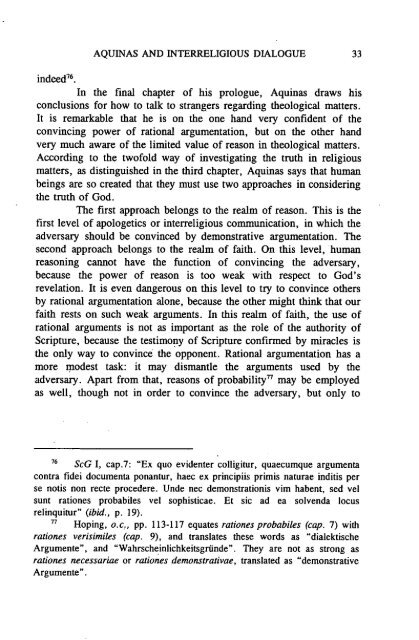Jaarboek Thomas Instituut 1997 - Thomas Instituut te Utrecht
Jaarboek Thomas Instituut 1997 - Thomas Instituut te Utrecht
Jaarboek Thomas Instituut 1997 - Thomas Instituut te Utrecht
Create successful ePaper yourself
Turn your PDF publications into a flip-book with our unique Google optimized e-Paper software.
AQUINAS AND INTERRELIGIOUS DIALOGUE 33<br />
indeed".<br />
In the final chap<strong>te</strong>r of his prologue, Aquinas draws his<br />
conclusions for how to talk to strangers regarding theological mat<strong>te</strong>rs.<br />
It is remarkable that he is on the one hand very confident of the<br />
convincing power of rational argumentation, but on the other hand<br />
very much aware of the limi<strong>te</strong>d value of reason in theological mat<strong>te</strong>rs.<br />
According to the twofold way of investigating the truth in religious<br />
mat<strong>te</strong>rs, as distinguished in the third chap<strong>te</strong>r, Aquinas says that human<br />
beings are so crea<strong>te</strong>d that they must use two approaches in considering<br />
the truth of God.<br />
The first approach belongs to the realm of reason. This is the<br />
first level of apologetics or in<strong>te</strong>rreligious communication, in which the<br />
adversary should be convinced by demonstrative argumentation. The<br />
second approach belongs to the realm of faith. On this level, human<br />
reasoning cannot have the function of convincing the adversary,<br />
because the power of reason is too weak with respect to God's<br />
revelation. It is even dangerous on this level to try to convince others<br />
by rational argumentation alone, because the other might think that our<br />
faith rests on such weak arguments. In this realm of faith, the use of<br />
rational arguments is not as important as the role of the authority of<br />
Scripture, because the <strong>te</strong>stimony of Scripture confirmed by miracles is<br />
the only way to convince the opponent. Rational argumentation has a<br />
more modest task: it may dismantle the arguments used by the<br />
adversary. Apart from that, reasons of probability" may be employed<br />
as well, though not in order to convince the adversary, but only to<br />
76 ScG I, cap.7: "Ex quo eviden<strong>te</strong>r colligitur, quaecumque argumenta<br />
contra fidei documenta ponantur, haec ex principiis primis naturae inditis per<br />
se notis non rec<strong>te</strong> procedere. Unde nee demonstrationis vim habent, sed vel<br />
sunt rationes probabiles vel sophisticae. Et sic ad ea solvenda locus<br />
relinquitur" (ibid., p. 19).<br />
77 Hoping, o.c., pp. 113-117 equa<strong>te</strong>s rationes probabiles (cap. 7) with<br />
rationes verisimiles (cap. 9), and transla<strong>te</strong>s these words as "dialektische<br />
Argumen<strong>te</strong>", and "Wahrscheinlichkeitsgründe". They are not as strong as<br />
rationes necessariae or rationes demonstrativae, transla<strong>te</strong>d as "demonstrative<br />
Argumen<strong>te</strong>" .








